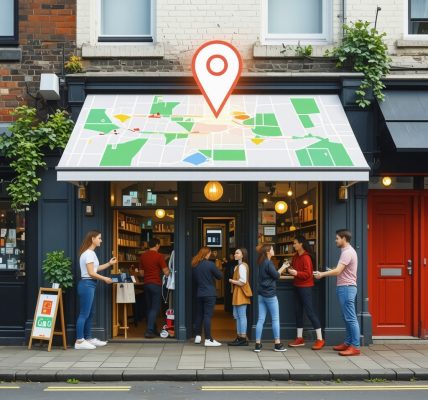Harnessing the Power of Local SEO for Dominant Google Maps Visibility
In the rapidly evolving digital marketplace, securing a top-tier position on Google Maps has transitioned from optional to imperative for local businesses striving to capture hyperlocal audiences. Effective local SEO strategies are no longer limited to basic citation building and keyword stuffing; they demand a nuanced understanding of Google’s evolving algorithms, user search intent, and behavioral data analytics. This article delves into sophisticated methodologies that elevate your Google Maps ranking, leveraging semantic SEO principles and expert-level insights to maximize your local search footprint.
Strategic Optimization of Google Business Profiles: Beyond the Basics
The Google Business Profile (GBP) serves as the linchpin for local SEO success. Expert optimization involves a holistic approach that integrates precise category selection, advanced keyword research for business descriptions, and systematic photo optimization to increase user engagement. Incorporating geo-specific LSI keywords organically into your GBP description enhances semantic relevance, improving your visibility in ‘near me’ and localized search queries. Additionally, consistent NAP (Name, Address, Phone number) citation management across authoritative directories fortifies local SEO authority, mitigating the risks of ranking penalties due to inconsistent data.
How Can Citation Consistency and Advanced Backlinking Synergize to Boost Local Rankings?
Citation consistency is foundational but not singularly sufficient for dominant local ranking. When paired with a strategic backlink profile focusing on local and niche-relevant domains, businesses can amplify their domain authority and trustworthiness signals to Google. High-quality backlinks from regional chambers of commerce, local industry associations, and reputable directories reinforce your business’s local relevance. Utilizing tools such as Moz Local for citation management and backlink monitoring enables proactive identification and rectification of SEO gaps, ensuring a resilient local presence. This synergy drives your Google Maps rankings beyond conventional thresholds, establishing a competitive moat in your local market.
Leveraging User-Generated Content and Review Management for Enhanced Trust and Ranking
Positive customer reviews shape local search rankings profoundly by influencing both Google’s algorithmic assessments and user trust. Implementing effective review generation strategies — such as timely review requests, incentivizing feedback without contravening Google’s guidelines, and responding to reviews professionally — elevates your business’s reputation and engagement metrics. Furthermore, embedding schema markup for reviews enriches search snippets, increasing click-through rates. Advanced tactics include analyzing review sentiment to identify service improvement opportunities, thereby creating a virtuous cycle of enhanced customer satisfaction and organic ranking growth.
Integrating Behavioral Analytics and Local Search Intent for SEO Precision
Understanding and aligning with user behavioral patterns and local search intent is a frontier in local SEO sophistication. Businesses must analyze metrics such as click-through rates, direction requests, and call actions derived from Google My Business Insights to tailor their listings and content dynamically. Utilizing hyperlocal SEO techniques, including targeting micro-moments and leveraging Google Maps SEO features, ensures your business appears precisely when and where potential customers are ready to engage. This data-driven optimization transcends static SEO tactics, embedding your brand contextually within the local digital ecosystem.
Explore further how to master comprehensive local SEO optimization techniques by visiting this expert guide to elevate your Google Maps strategy.
For a deeper dive into harnessing Google Business Profile effectively, consider the authoritative insights provided by the recent academic analysis on local search ranking factors which underscores the critical interplay of citations, reviews, and behavioral signals in 2023.
Interested in contributing your professional local SEO experiences or exploring advanced strategies? Join our community discussions and share your insights to help shape the future of Google Maps optimization.
Harnessing Behavioral Analytics for Hyperlocal SEO Precision
To truly excel in Google Maps rankings, businesses must pivot towards leveraging behavioral analytics beyond mere surface-level metrics. Key performance indicators such as click-through rates (CTR), direction requests, and phone call actions provide actionable intelligence that refines local SEO strategies. By analyzing this data through platforms like Google My Business Insights and integrating it with hyperlocal SEO tactics, businesses can adapt their listings to meet the nuanced expectations of their target audience dynamically.
For instance, understanding peak engagement times and popular customer pathways enables the tailoring of Google Business Profile content and posting schedules, maximizing visibility during critical micro-moments. This approach aligns with Google’s increasing emphasis on user intent and contextual relevance, ensuring listings are not only found but actively engaged with by prospective customers.
Delve deeper into these data-driven techniques in our comprehensive guide to tracking GMB performance metrics for superior local search outcomes.
Synergizing Citation Consistency and Local Backlink Profiles
While maintaining NAP citation consistency is foundational, its real power unfolds when combined with a robust backlink strategy targeting local and industry-specific domains. This dual approach fortifies your Google Business Profile’s authority and signals relevance to search engines more effectively than isolated efforts.
High-quality backlinks from trusted local organizations, such as chambers of commerce, event sponsorships, and niche directories, act as endorsements that elevate your domain authority within the local ecosystem. Moreover, regular audits using tools like Moz Local or BrightLocal ensure citation accuracy and backlink health, preventing detrimental discrepancies that could erode ranking potential.
Businesses that master this synergy position themselves advantageously in the competitive local search arena, capitalizing on Google’s trust mechanisms and semantic relevance algorithms.
What Emerging Tools and Techniques Can Revolutionize Local SEO Management in 2025?
The landscape of local SEO is rapidly evolving, with innovative tools incorporating AI-driven insights, automated citation monitoring, and advanced sentiment analysis reshaping optimization workflows. Emerging platforms now offer predictive analytics to forecast ranking fluctuations based on behavioral trends and competitor movements, enabling preemptive strategy adjustments.
Additionally, integrating schema markup automation and enhanced review management systems streamlines the process of enriching Google Business Profiles with structured data and authentic user feedback, amplifying both visibility and trustworthiness.
Staying ahead requires continuous learning and adaptation, leveraging these cutting-edge technologies to maintain a competitive edge in local markets.
Explore the latest advancements and practical applications in our detailed resource on GMB SEO tools for 2025.
Elevating Engagement Through Strategic User Interaction and Review Management
Active management of user-generated content, particularly reviews, remains a pillar of local SEO success. Beyond soliciting positive feedback, businesses must engage authentically by responding promptly and thoughtfully to all reviews, fostering community trust and demonstrating commitment to customer satisfaction.
Advanced sentiment analysis tools facilitate monitoring of review trends, enabling businesses to identify and rectify systemic service issues proactively. This not only boosts customer retention but also enhances the qualitative signals that Google’s algorithm interprets when ranking local businesses.
Implementing structured review schema further enriches search results, increasing click-through rates and reinforcing credibility in competitive local landscapes.
Learn more about effective GMB review generation and management strategies to build lasting local authority.
Have you experimented with any innovative local SEO tools or techniques? Share your experiences in the comments to contribute to our growing professional community and help others master Google Maps optimization.
According to the Moz Local Search Ranking Factors 2023 report, citation consistency combined with quality backlinks and behavioral engagement are among the top determinants for securing prime Google Maps positions, underscoring the critical importance of integrated SEO strategies.
AI-Driven Semantic SEO: The Next Frontier for Google Maps Optimization
As artificial intelligence continues to reshape digital marketing, its integration with semantic SEO offers unprecedented opportunities to dominate Google Maps rankings. Leveraging AI-powered natural language processing (NLP) algorithms allows businesses to optimize their Google Business Profiles with contextually rich, semantically relevant content that resonates with user intent beyond mere keyword matching.
By deploying AI tools capable of semantic analysis, local businesses can identify nuanced, long-tail search queries and latent semantic indexing (LSI) keywords that align with evolving search behaviors. This sophisticated keyword layering enhances the topical authority of the Google Business Profile, ensuring the profile surfaces prominently for a broader spectrum of localized queries including voice searches and conversational queries.
How Can AI-Enhanced Semantic SEO Transform Local Search Visibility in 2025?
AI-enhanced semantic SEO transforms local search visibility by dynamically adapting your Google Business Profile content to reflect real-time shifts in search intent and user behavior. This adaptive content strategy, powered by machine learning models analyzing search trends and competitor activity, enables businesses to preemptively optimize for emerging local search patterns before competitors respond.
Moreover, AI-driven content generation tools can assist in crafting optimized business descriptions, FAQs, and posts imbued with geo-targeted semantic cues that improve both user engagement and algorithmic relevance. Combined with automated schema markup integration, these tactics amplify rich snippet appearances, significantly boosting click-through rates (CTR) from Google Maps and local SERPs.
Industry leaders such as BrightLocal and Moz have begun integrating AI analytics into their platforms, enabling marketers to harness predictive insights that anticipate ranking fluctuations and consumer intent nuances (Moz Local Search Ranking Factors 2023).
Implementing Advanced Structured Data: Beyond Basic Schema for Local SEO Excellence
While basic schema markup for NAP and reviews is standard practice, advanced structured data implementation can unlock deeper semantic understanding by search engines, thereby enhancing Google Maps rankings.
Incorporating Schema.org types such as Service, GeoCoordinates, and OpeningHoursSpecification with precise, dynamically updated values allows Google to parse your profile with granularity. This level of detail supports enhanced local search features, including availability filters and service-specific queries.
Furthermore, embedding Event schema for local promotions or community engagements can create timely, localized search triggers, driving surge traffic and improving temporal relevance. Advanced structured data strategies also encompass the use of JSON-LD format to ensure seamless integration and future-proofing against evolving search engine requirements.
These implementations require meticulous coordination between SEO specialists and web developers to maintain accuracy and minimize errors, as misconfigured structured data can lead to penalties or loss of rich snippet eligibility.
Deep-Dive into Behavioral Analytics: Predictive Modeling for Local Consumer Engagement
Beyond descriptive analytics, predictive behavioral modeling represents a cutting-edge approach to local SEO optimization. By analyzing historical user interaction data from Google My Business Insights combined with external datasets such as demographic trends and local event calendars, businesses can forecast consumer engagement patterns.
This forecasting enables proactive content adjustments and targeted promotional campaigns scheduled to coincide with anticipated demand spikes. For example, a restaurant might predict increased direction requests during local festivals and adjust its Google Posts and offers accordingly.
Implementing tools like Google Analytics 4’s predictive metrics and integrating with CRM platforms provides a holistic view of customer journeys, from discovery on Google Maps to conversion in-store or online.
Such predictive analytics not only optimize SEO efforts but also enhance operational readiness, aligning marketing strategies with consumer behavior proactively rather than reactively.
What Are the Best Practices for Seamlessly Integrating Predictive Behavioral Analytics into Local SEO Workflows?
Best practices for integrating predictive behavioral analytics into local SEO workflows involve establishing robust data collection pipelines from diverse touchpoints, including Google My Business, website interactions, and social media. Ensuring data quality and privacy compliance is paramount.
Next, leveraging machine learning platforms that support real-time data processing and model retraining enables continuous refinement of predictive accuracy. Close collaboration between SEO strategists, data scientists, and marketing teams ensures insights translate into actionable tactics such as dynamic content updates, personalized messaging, and localized ad targeting.
Regular audits of model performance and alignment with business goals help maintain relevance and ROI, while automation tools can streamline deployment, freeing resources for creative strategy development.
For an expert walkthrough of predictive analytics implementation, consider resources like the Dataversity guide on predictive analytics in local marketing.
Unlock the full potential of your Google Maps presence by embracing these advanced semantic, structured data, and behavioral analytics strategies. Stay tuned for our next segment where we explore the integration of omni-channel marketing with local SEO to create a unified customer experience.
Advanced AI-Powered Semantic SEO: Unlocking Dynamic Local Search Adaptation
The integration of artificial intelligence technologies into semantic SEO heralds a transformative epoch for Google Maps optimization. Unlike static keyword strategies, AI-driven semantic SEO leverages sophisticated natural language processing algorithms that interpret and generate contextually nuanced content tailored to evolving user intents and local search patterns. This dynamic adaptation not only enhances topical depth but also anticipates and incorporates emerging search queries, especially those related to voice and conversational interfaces, thereby expanding reach within the local digital ecosystem.
Structured Data Evolution: Implementing Multi-Dimensional Schema for Superior Local Signals
Moving beyond foundational schema markups, advanced implementation involves deploying multi-dimensional structured data sets such as Service, GeoCoordinates, OpeningHoursSpecification, and Event schemas that collectively enrich Google’s comprehension of your business context. Utilizing JSON-LD with real-time updates ensures that search engines receive accurate and granular information, facilitating enhanced features like availability filters and event-triggered rankings. This meticulous approach requires collaboration between SEO specialists and developers to ensure semantic integrity and compliance with evolving Google guidelines.
How Can Predictive Behavioral Analytics Revolutionize Local SEO Strategy Execution?
Predictive behavioral analytics transcends traditional descriptive metrics by forecasting consumer actions based on historical interaction data, demographic trends, and local event cycles. By integrating machine learning models that analyze Google My Business Insights alongside external data sources, businesses can proactively calibrate their Google Posts, promotional offers, and content timing to coincide with anticipated demand surges. This forward-looking methodology not only optimizes visibility during high-intent micro-moments but also synchronizes marketing efforts with consumer behavior trajectories, thereby maximizing conversion potential.
According to the Dataversity guide on predictive analytics in local marketing, effective integration requires robust data pipelines, continuous model retraining, and cross-functional collaboration to translate predictive insights into actionable SEO tactics.
Harnessing AI-Driven Tools for Proactive Local SEO Management
The emergent landscape of AI-empowered SEO tools offers unparalleled capabilities such as automated citation monitoring, sentiment analysis for review management, and predictive ranking fluctuation alerts. Platforms integrating these technologies enable marketers to anticipate algorithmic changes and consumer intent shifts, adapting their strategies with precision and agility. Embracing these innovations facilitates sustained competitive advantage within hyperlocal markets while optimizing resource allocation and strategic focus.
Unlocking the Synergy Between Omni-Channel Marketing and Local SEO
Integrating omni-channel marketing approaches with advanced local SEO strategies creates a cohesive customer journey that transcends isolated touchpoints. By aligning Google Business Profile optimization with targeted social media engagement, localized paid advertising, and personalized email campaigns, businesses reinforce brand presence and drive consistent consumer interaction across platforms. This unified framework amplifies data insights, enabling refined segmentation and hyper-personalization that elevate engagement metrics and reinforce Google’s trust signals.
Explore these cutting-edge strategies and share your insights to collaboratively advance the frontier of Google Maps optimization.
Expert Insights & Advanced Considerations
AI-Driven Semantic SEO as a Dynamic Optimization Catalyst
AI-powered semantic SEO transcends traditional keyword tactics by interpreting user intent and generating context-rich content tailored for evolving local search patterns. This dynamic approach ensures your Google Business Profile remains relevant across voice searches and conversational queries, positioning your business ahead in the competitive local ecosystem.
Multi-Dimensional Structured Data Enhances Local Search Signals
Integrating advanced schema types such as Service, GeoCoordinates, and Event in JSON-LD format enriches Google’s understanding of your business context. This granular data enables enhanced features like availability filters and event-triggered boosts, elevating your Google Maps rankings beyond basic markup practices.
Predictive Behavioral Analytics Empowers Proactive SEO Strategy
Analyzing historical interaction data combined with demographic and local event insights allows forecasted consumer behaviors to guide timely content adjustments and promotions. This foresight aligns marketing efforts with peak demand micro-moments, maximizing engagement and conversion potential on Google Maps.
Synergizing Citation Consistency with Localized Backlink Profiles
Maintaining accurate NAP data across authoritative directories paired with quality backlinks from local organizations significantly increases domain authority and trustworthiness. This synergy fortifies your Google Business Profile’s ranking potential by signaling strong local relevance to search algorithms.
Omni-Channel Integration Amplifies Local SEO Impact
Combining Google Business Profile optimization with targeted social media campaigns, localized paid ads, and personalized email outreach creates a cohesive brand presence. This unified approach enhances data insights and consumer engagement metrics, reinforcing Google’s trust signals and boosting your Google Maps visibility.
Curated Expert Resources
Moz Local Search Ranking Factors 2023: A comprehensive analysis of the critical ranking signals in local SEO, offering actionable data-backed insights for Google Maps optimization.
RankingSEOgmb.com – Effective GMB Ranking Strategies: An authoritative guide detailing nuanced tactics for elevating your Google Business Profile and dominating local search results.
Dataversity Guide on Predictive Analytics in Local Marketing: Explores integrating predictive behavioral models into local SEO workflows for anticipatory strategy development.
BrightLocal Platform: A leading toolset featuring AI-driven insights, citation management, and review monitoring essential for modern local SEO professionals.
Google My Business Insights Documentation: Official resource for harnessing behavioral analytics data to refine and adapt Google Maps listings effectively.
Final Expert Perspective
Mastering Google Maps ranking in 2025 demands a sophisticated blend of AI-enhanced semantic SEO, advanced structured data implementation, and predictive behavioral analytics. These elements converge to create dynamic, contextually relevant Google Business Profiles that resonate deeply with user intent and local search nuances. By integrating citation consistency with authoritative local backlinks and leveraging omni-channel marketing strategies, businesses can build resilient and authoritative local presences that withstand algorithmic shifts. For those committed to sustainable growth and dominant visibility, embracing these advanced methodologies is no longer optional but essential. Engage further with expert resources and share your insights to contribute to this evolving landscape, ensuring your Google Maps optimization strategies remain at the forefront of local SEO innovation. Explore comprehensive tactics and elevate your local search impact with our detailed guides on effective GMB ranking strategies and review generation best practices.



